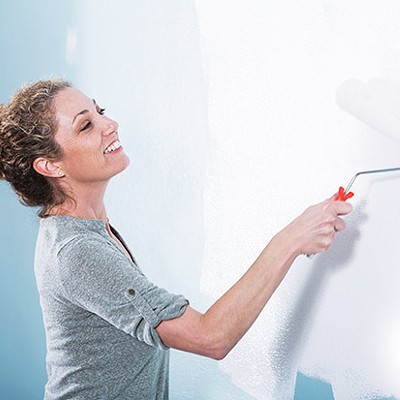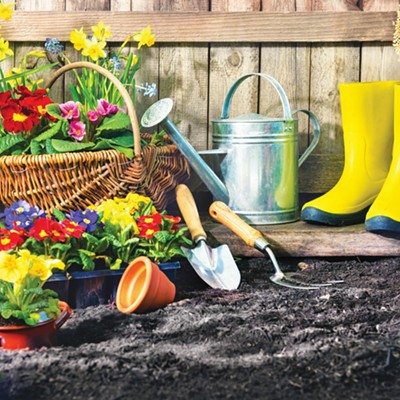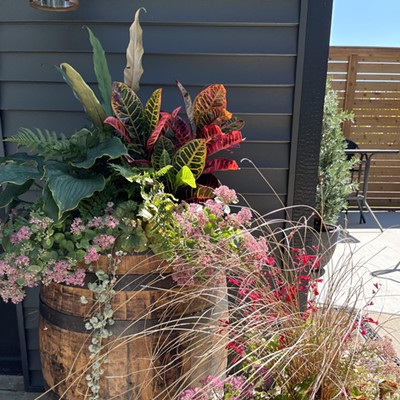To be successful in life, you need things like motivation, focus, planning and perseverance.
All well and good. But, if you’re like many Americans, first you have to get organized. You need to find your stuff. And to do that, you must deal with clutter.
For this 30-day challenge, we’re going to show you how to do something about the kind of clutter that holds you back and give yourself the best chance to be happy, healthy and more productive. Whether you have too many junk drawers in the kitchen or entire rooms in your home that are simply unmanageable, there is a better way.
To learn how to get there, we enlisted the help of an expert, Daria LaMoure. When we tagged along on a recent weekday afternoon, she was helping a client who simply has many interests and not enough places to put all her stuff.
The client, Joey Miller, is a dietitian for her full-time job, but she’s also an artist (oil on canvas), a musician (there’s a piano and two keyboards in the room), a two-dog owner, an avid rock climber, a skateboarder and a prolific reader.
What to do? LaMoure says you must start by asking yourself how you want a room to function. At Miller’s East Sacramento home, which she shares with her life partner of 20 years, Todd Phillpotts, the focus is on the dreaded guest bedroom, which she uses as an office and art studio.
The old flat-screen TV taking up space in the corner is on the “get-rid-of” list, and it immediately clears away plenty of visual clutter when Miller carts it away. Like many people, she had put the nonworking TV against the wall and told herself she would eventually dispose of it. Days turned into months.
The bookcases are full, including scores of collector “you are here” coffee mugs from Starbucks, still in their boxes and neatly arranged to show the cities Miller has visited. When she glanced at the book titles, Miller conceded she could easily pare down her collection.
“The first thing you do is decide what’s the purpose of the room,” said LaMoure.”For her, the purpose is art, but it’s also a music room. To make any decisions about what stays or goes, you have to decide what’s its function and what’s your vision for it. Once you see what you want and the feeling you are looking for, then it’s a lot easier to see what doesn’t fit.”
After the TV was removed, Miller decided to give her nephew one of her keyboards. The turtles were moved to the main living/dining area so she could see them more often. Suddenly, things were looking up.
For your 30-day challenge, if you decide this is for you, you’re going to do much like Miller is doing – deciding how you want your particular space to function and then deciding what stays and what must go. The classic method is to create three piles – throw away, donate, keep. Often, we get so committed to our stuff that we need a neutral person or expert like LaMoure to guide us.
What makes LaMoure so smart when it comes to clutter? For one, she grew up in Russia, where possessions were not so important. Yes, clutter and the need for more and more stuff, she says, is a very American phenomenon. She started her business in 2011 to help people get organized, but she noticed that her clients quickly got bogged down once again only weeks or months later.
Then she read the best-selling book The Life-Changing Magic of Tidying Up: The Japanese Art of Decluttering and Organizing by Marie Kondo and realized that the problem wasn’t just organizing; it was stuff.
“Instead of holding onto things that give you negative feelings, you should have things that inspire you,” LaMoure said.
We left Miller’s home after a couple of hours. There was still plenty of work to be done, but she was well on her way.
–Tribune News Service
Are you bogged down by clutter?
Here’s the fix.
[
{
"name": "Air - MedRect Combo - Inline Content 1",
"component": "11490391",
"insertPoint": "3",
"requiredCountToDisplay": "1",
"parentWrapperClass": "fdn-ads-inline-content-block"
},{
"name": "Air - MedRect Combo - Inline Content 2",
"component": "11490392",
"insertPoint": "7",
"requiredCountToDisplay": "5",
"parentWrapperClass": "fdn-ads-inline-content-block"
},{
"name": "Air - MedRect Combo - Inline Content 3",
"component": "11490393",
"insertPoint": "12",
"requiredCountToDisplay": "9",
"parentWrapperClass": "fdn-ads-inline-content-block"
}
]
Illinois Times has provided readers with independent journalism for almost 50 years, from news and politics to arts and culture.
Your support will help cover the costs of editorial content published each week. Without local news organizations, we would be less informed about the issues that affect our community..
Got something to say?
Send a letter to the editor and we'll publish your feedback in print!






















